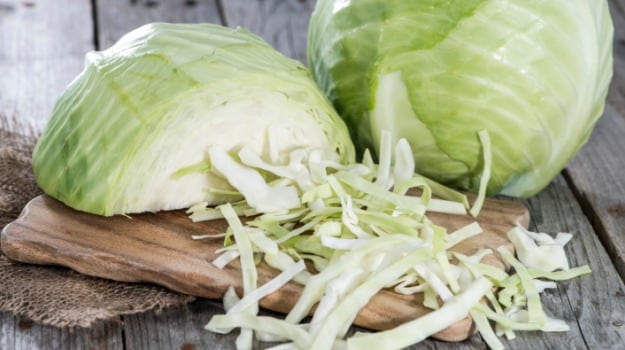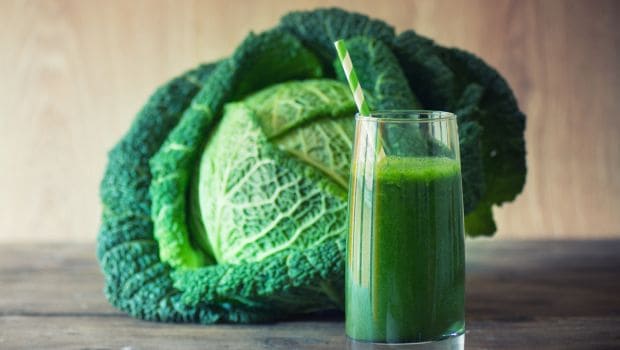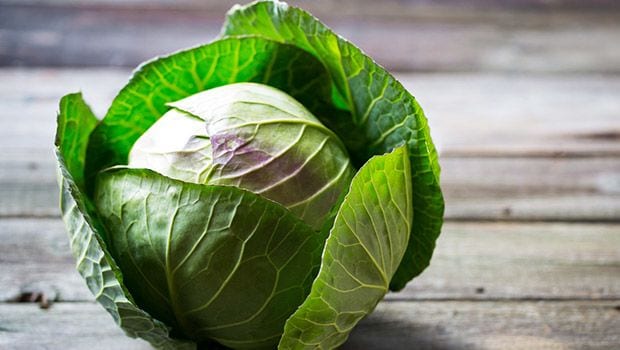Cabbage is a cruciferous vegetable, which is loaded with health-benefiting properties. This multi-layered veggie is a powerhouse of vitamins A, B1, B2, B6, E, C, K, and minerals like calcium, iron, iodine, potassium, sulphur, phosphorus and folate. Cabbage is a superhero among the category of leafy vegetables. You can add them to your diet by various means; be it boiled, cooked, steamed, sauteed, or even juiced. It has numerous medicinal properties, which could be credited as god's gift to mankind.
Here are some incredible health benefits of cabbage that must know:
Promotes Weight Loss
Just like all the other cruciferous vegetables, cabbage is also rich in antioxidants, fibre and vitamins. It is also quite low in calories. If you eat a whole cabbage, you will feel full and get plenty of your required nutrients, but not gain many calories. Cabbage can be fermented to make sauerkraut, a delicious and sour food, which is healthy for the ones who are watching their weight. Fermenting is done with the help of bacteria called the probiotics. When we consume food containing probiotics, it takes a short-term residence in our digestive system, which plays an important role in improving our overall body metabolism.
(Also Read: 5 Indian Delicious Protein Snacks For Weight Loss)

Cabbage is rich in vitamin C and sulphur
Helps Detoxify Body
Cabbage is rich in vitamin C and sulphur; both are known to remove toxins such as free radicals and uric acid from our body. Moreover, cabbage juice contains 'Indole-3 carbonile' antioxidant, which plays a pivotal role in detoxifying our liver. The liver plays a crucial role in various metabolic functions of the body - protein synthesis, hormone production, glycogen storage regulation, etc. According to Dr. Komal, Nutritionist at SCI International Hospital, "Cabbage juice helps in improving the bowel movement as well and as such keeps the liver in a good condition."
Manages Blood Sugar
Red cabbages are rich in phytonutrients called betalains, which give them their distinctive colour. Betalains are known to lower blood sugar levels and aid in insulin production. Cabbage is also packed with antioxidant and anti-hyperglycaemic properties that make it a medicine for diabetes. As per a study published in the British Medical Journal, eating cruciferous vegetables like cabbage, broccoli and spinach may reduce the risk of developing type-2 diabetes. A diet rich in leafy green vegetables was associated with a 14 percent reduced risk of developing diabetes.
(Also Read: How to Control Diabetes: 10 Tips to Maintain Blood Sugar Level)

Cabbage juice helps in improving the bowel movement
Promotes Healthy Skin
Both purple and green cabbages are rich in silicon and sulphur, which are known as 'beauty minerals'. Sulphur is particularly present in every cell as it is responsible for pulling in nutrition and removing waste from the cells; this is what is called osmosis. For clear skin, you need to have good osmosis. According to the book, 'Healing Foods', by DK Publishsing, Cabbage "contains vitamins C and K, and antioxidants that protect skin from free-radical damage. Its sulphur content may be useful in healing acne and eczema."
Cabbage Nutrition
According to the United States Department of Agriculture (USDA), per 100 grams of cabbage contain 0.10 gm fat, 18 mg sodium, 170 mg potassium, 5.80 gm carbohydrates and 1.28 gm protein.
With such potential health benefits, it is easy to see why cabbage deserves a limelight and some space in your plate.
About Shubham BhatnagarYou can often find Shubham at a small authentic Chinese or Italian restaurant sampling exotic foods and sipping a glass of wine, but he will wolf down a plate of piping hot samosas with equal gusto. However, his love for homemade food trumps all.








